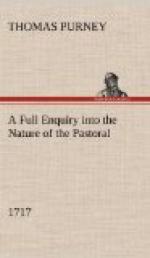Collikin has Simplicity and Tenderness: But withal a Tincture of Inconstancy in his Nature.
Soflin, with her Simplicity and Tenderness, is excessive Easy, and Complying, to a Fault; open and too free-hearted.
Florey has Simplicity; and Tenderness for his Lass; but he is almost out of Humour with himself for being so soft. He is suppos’d to be brought up in the lonely Cave with Paplet; and his natural Tamper is wild and excessive brisk; hating the House, and delighting in Hunting. But you show, I see, only a Glimpse of his Natural Temper, which breaks out at times; but he is drawn as tender, being all the Time in Love with Poppit.
The rest of your Characters have the same Foundation; nor break in, I think, upon Simplicity and Tenderness.
’Tis true indeed, as to the Difficulty of forming Pastoral Characters, beyond those of Epick Poetry; That even there, one general Character should diffuse it self thro’ all the rest, and that is Bravery. (For Homer might, I think, as well have brought in a Baboon, or a Hedge-hog, for Heroick Characters, as a Vulcan and a Thirsites.) But Bravery will coincide with greatly more Tempers than Pastoral Simplicity and Tenderness; nor does it lay the Poet under a Restraint comparably so great.
’Tis farther observable, as to the Difficulty of forming the Pastoral Characters, that if we wou’d write up to the Perfection of Pastoral, ’tis necessary that whatever habit or temper of Mind distinguishes any CHARACTER in the first Pastoral, wherever that CHARACTER afterwards appears, thro’ the whole set of Pastorals, it must appear with the same Temper as before; that is, ’tis not enough to have the Characters uniform and just thro’ one and the same Pastoral, but what is the Character of any Swain or Lass in the first and second Pastoral, that must be their Character in all the rest, if they are nam’d or introduc’d, tho’ never so slightly. For by this means, not only every single Pastoral will make a regular Piece, but the whole set of Pastorals also constitute together one uniform and ample Poem; if the Reader delights to fill his Mind with a large and ample Scheme.
The set of Pastorals would be still more perfect, if the Characters were also all continued on from the first to the last Pastoral, and none drop’d, as ’twere, in silence; but in the Pastorals which draw towards the End, the Characters should be all disposed of in Pastoral, and after an entertaining Manner; so that the two or three last Pastorals will be like the fifth Act in a Tragedy, where the Catastrophe is drawn up. The reasonableness of this appear’s from hence. I suppose the Poet to form his Story so, and so to draw his Characters, that the Reader’s Mind may be engag’d and concern’d for the Personages. Now the Mind is uneasy if ’tis not let into the issue of the Affairs of the Person it has been long Intent upon, and given to know whether he is finally Unfortunate, or Happy.




